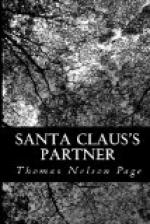Here Santa Claus, the last survivor of the old benefactors, who has outlasted whole hierarchies of outworn myths and, yet firm in the devotion of the heart of childhood, snaps his fingers alike at arid science and blighting stupidity, was driving his reindeer, his teeming sleigh filled with wonders from every region: dolls that walked and talked and sang, fit for princesses; sleds fine enough for princes; drums and trumpets and swords for young heroes; horses that looked as though they were alive and would spring next moment from their rockers; bats and balls that almost started of themselves from their places; little uniforms, and frocks; skates; tennis-racquets; baby caps and rattles; tiny engines and coaches; railway trains; animals that ran about; steamships; books; pictures—everything to delight the soul of childhood and gratify the affection of age.
There Kris Kringle, Santa Claus’s other self, with snowy beard, and fur coat hoary with the frost of Arctic travel from the land of unfailing snow and unfailing toys, stood beside his tree glittering with crystal and shining with the fruits of every industry and every clime.
These were but a part of the dazzling display that was ever repeated over and over and filled the windows for squares and squares. Science and Art appeared to have combined to pay tribute to childhood. The very street seemed to have blossomed with Christmas.
But Livingstone saw nothing of it. He was filled with anger that his way should be blocked. The crowds were gay and cheery. Strangers in sheer good-will clapped each other on the shoulder and exchanged views, confidences and good wishes. The truck-drivers, usually so surly, drew out of each others’ way and shouted words of cheer after their smiling fellows.
The soul of Christmas was abroad on the air.
Livingstone did not even recall what day it was. All he saw was a crowd of fools that impeded his progress. He tried the middle of the street; but the carriages and delivery-wagons were so thick, that he turned off, growling, and took a less frequented thoroughfare, a back street of mean houses and small shops where a poorer class of people dwelt and dealt.
Here, however, he was perhaps even more incommoded than he had been before. This street was, if anything, more crowded than the other and with a more noisy and hilarious throng. Here, instead of fine shops, there were small ones; but their windows were every bit as attractive to the crowds on the street as those Livingstone had left. People of a much poorer class surged in and out of the doors; small gamins, some in ragged overcoats, more in none, gabbled with and shouldered each other boisterously at the windows and pressed their red noses to the frosty panes, to see through the blurred patches made by their warm breath the wondrous marvels within. The little pastry-shops and corner-groceries vied with the toy-shops and confectionaries, and were packed with a population that hummed like bees, the busy murmur broken every now and then by jests and calls and laughter, as the customers squeezed in empty-handed, or slipped out with carefully-wrapped parcels hugged close to their cheery bosoms or carried in their arms with careful pride.




